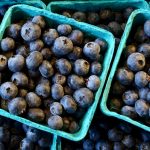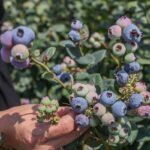Peru expects to recover blueberry volumes in 2024

Peru's 2023-24 blueberry season, hit hard by El Niño conditions, saw a 25% drop in volume year-on-year, down to 215,000 tons, according to data from Proarándano.
This year, the industry expects volume to bounce back. That could have an affect on the strong pricing Peru secured from limited volume.
"The drop in production last year was dramatic," said Luis Miguel Vegas, former manager of Proarándanos told FreshFruitPortal.com. "The country was still able to export a significant volume, but far from the initial projection."
Northern Peru, between La Libertad and Lambayeque, where most blueberry acreage is located, was most affected by El Niño. Vegas said Peru's most widely planted varieties, such as Biloxi and Ventura, took the greatest hit.
"Companies now have the experience of atypical weather, because of last year, and are taking greater measures to deal with this type of situation," he said.
As a result of the volume shock, Peru secured higher export prices with a 22.8% increase in year-on-year value to US$1.67 billion, according to estimates from the Ministry of Agricultural Development (MIDAGRI). Peru’s overall agricultural exports increased 2.9% in value to $10.54 billion.
"Last year prices were very good, since a gap was created," Vegas said. "There was little fruit, so the companies that were able to get their fruit to the markets were paid good prices during certain weeks of the year. Are we going to see the same prices this year? I doubt it; I think they will be below."
Peru is the world's top blueberry exporter. The country provided 43% of U.S. fresh blueberry imports in 2023, according to USDA data. Volume imported by the U.S. dropped to 240.8 million pounds, however, down from 323.1 million in 2022.
Projections for 2024
Vegas said early projections suggest more volume this year than in the previous blueberry season.
"What I can't say for sure is if there will be more volume than two seasons ago," he said. "It's too early to tell."
To optimize sales, and prevent stacking volume in a gamble for higher prices, Vegas said the key is industry education.
"Companies that are well informed will be able to optimize their sales, getting better prices," Vegas said. "Associations like Proarándanos play a critical role in providing frequent and accurate information to the industry. The idea is to be informed as best as possible, in terms of how much volume is going to the markets and in which weeks."
Promotions and marketing during high-volume weeks will also be key, Vegas said, to encourage production rotation in major markets.















































